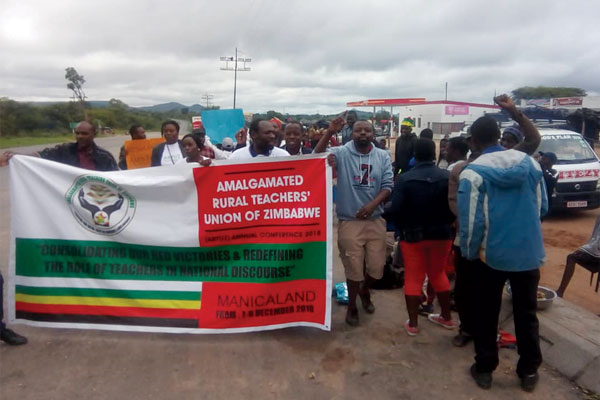
By Farai Matiashe
Teachers’ unions have said their members are still receiving threats from government and State security agencies amid fears of a looming mass industrial action.
Early this year, some teachers responded to calls of strike by unions, including the Progressive Teachers’ Union of Zimbabwe (PTUZ), Zimbabwe Teachers’ Association (Zimta) and Amalgamated Rural Teachers’ Union of Zimbabwe (Artuz), among others, over poor remuneration and inadequate salaries.
The unions eventually called off the strike despite failing to reach an agreement with government.
“The State has upped the gear on harassment, the most recent cases being the salary freeze for Munyaradzi Ndawana of Mashonaland West. No justification has been proffered by the government for this unacceptable act. Maxwell Basiyavo was abducted and tortured by State security agents in Guruve on April 5, 2019. Our members still receive threats from State agents through anonymous phone calls,” Artuz president Obert Masaraure said.
PTUZ secretary-general Raymond Majongwe said their members who heeded their calls for strike action early this year were still being intimidated by government.
“They intimidated people and they still continue to intimidate people. What we are saying and what we are doing is correct, and they know that they have several issues that they must deal with because the teachers listened to the call for strike that was legitimate. Government know they are wrong and they are just try to bully and intimidate us using the Public Service Commission, letters and circulars and everything that they will never execute,” he said.
Majongwe said towards the end of the first term, the government sent forms to schools, demanding that those teachers who participated in the strike should fill in indicating the days they were absent from work.
- Chamisa under fire over US$120K donation
- Mavhunga puts DeMbare into Chibuku quarterfinals
- Pension funds bet on Cabora Bassa oilfields
- Councils defy govt fire tender directive
Keep Reading
“We have stuck to our guns that the instruction is illegal. They cannot force our teachers and our members to comply with an illegal instruction. There is no law that says if teachers go for a strike, they must complete leave forms,” he said.
“If government knows that 10 200 teachers went on strike; why won’t they just deal with those 10 200 and take them to court? You don’t impose a decision and pass judgment at the same time. Teachers need to be charged if they committed an offence and the fact that they had to give teachers a new increment, that is evidence enough that government was in the wrong and they were trying to address a problem.”
This week, prices of basic commodities went up, with a standard loaf of bread now costing ZWL$3,50 from ZWL$2, and a 10kg of maize meal shot to ZWL$12 from ZWL$7 last week, further eroding the salaries of civil servants.
Masaraure said they had not received a salary increment which the government promised them, while their salary was being eroded each day.
“The government is still to award us any salary increment. We are still earning well below the around $500 we were earning before the currency chaos instigated by the introduction of the bond notes and RTGS dollars. An average teacher today is earning around US$120,” he said. He said when schools open next term, industrial action would be inevitable because most of their members were struggling to make ends meet.
“It is going to be very difficult for teachers to attend to their duties at the opening of the second term. Teachers will be incapacitated and a series of job actions are imminent,” Masaraure said.
Zimta president Richard Gundani told NewsDay that there was need for dialogue with the government to correct the issue of prices which have shot up.
“Now that a salary increment has been effected, we have seen prices going up. We are worried and the government has to make efforts to correct that. The dialogue should result in the stabilisation of prices. We are realising that we are in uncertainty. This environment has to be corrected,” he added.







